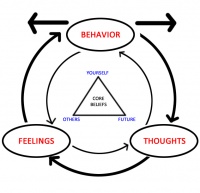Introduction to Psychology 1/IPSY101/Contemporary Psychology/Clinical and forensic psychology
| “ | Everything that irritates us about others can lead us to an understanding of ourselves. | ” |
| —Carl Gustav Jung | ||
Clinical psychology
Clinical psychology is the area of psychology that focuses on the diagnosis and treatment of psychological disorders and other problematic patterns of behaviour. As such, it is generally considered to be a more applied area within psychology; however, some clinicians are also actively engaged in scientific research.
Counselling psychology is a similar discipline that focuses on emotional, social, vocational, and health-related outcomes in individuals who are considered psychologically healthy.
As mentioned earlier, both Freud and Rogers provided perspectives that have been influential in shaping how clinicians interact with people seeking psychotherapy. While aspects of the psychoanalytic theory are still found among some of today’s therapists who are trained from a psychodynamic perspective, Roger’s ideas about client-centred therapy have been especially influential in shaping how many clinicians operate. Furthermore, both behaviourism and the cognitive revolution have shaped clinical practice in the forms of behavioural therapy, cognitive therapy, and cognitive-behavioural therapy. Issues related to the diagnosis and treatment of psychological disorders and problematic patterns of behaviour will be discussed in detail in later chapters of this textbook.
By far, this is the area of psychology that receives the most attention in popular media, and many people mistakenly assume that all psychology is clinical psychology.
Forensic psychology
Forensic psychology is a branch of psychology that deals questions of psychology as they arise in the context of the justice system. For example, forensic psychologists (and forensic psychiatrists) will assess a person’s competency to stand trial, assess the state of mind of a defendant, act as consultants on child custody cases, consult on sentencing and treatment recommendations, and advise on issues such as eyewitness testimony and children’s testimony (American Board of Forensic Psychology, 2014[1]). In these capacities, they will typically act as expert witnesses, called by either side in a court case to provide their research- or experience-based opinions. As expert witnesses, forensic psychologists must have a good understanding of the law and provide information in the context of the legal system rather than just within the realm of psychology. Forensic psychologists are also used in the jury selection process and witness preparation. They may also be involved in providing psychological treatment within the criminal justice system. Criminal profilers are a relatively small proportion of psychologists that act as consultants to law enforcement.
References
- ↑ American Board of Forensic Psychology. (2014). Brochure. Retrieved from http://www.abfp.com/brochure.asp
- Source
- This page was proudly adapted from Psychology published by OpenStax CNX. Oct 31, 2016 under a Creative Commons Attribution 4.0 license. Download for free at http://cnx.org/contents/4abf04bf-93a0-45c3-9cbc-2cefd46e68cc@5.52.


